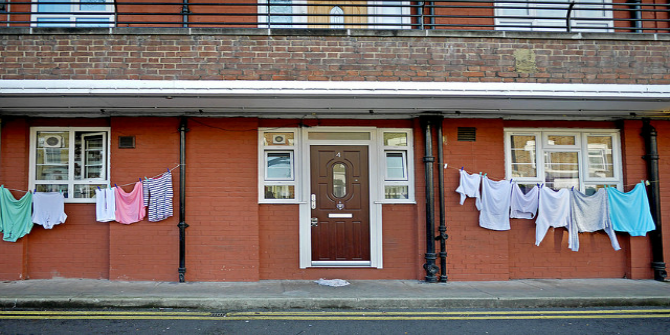 Encouragingly, in-work poverty is gaining traction as a key challenge of our time. Katie Schmuecker looks at some of the potential policy solutions for helping working families out of poverty, writing that there is no quick fix to the problem of in-work poverty, and the measures required will vary depending on the circumstances of the household experiencing it.
Encouragingly, in-work poverty is gaining traction as a key challenge of our time. Katie Schmuecker looks at some of the potential policy solutions for helping working families out of poverty, writing that there is no quick fix to the problem of in-work poverty, and the measures required will vary depending on the circumstances of the household experiencing it.
The biggest group of families with children living in poverty are couple families where one parent goes out to work – usually the father – while the other stays at home to look after the children. It seems the traditional family model does not offer a guaranteed route out of poverty for those in low paid work.
These figures are a real headache for governments that trumpet work as the best route out of poverty. They also raise a challenging question about how viable the traditional family model is for low income families in our society. So what options are open to tackle the problem of in-work poverty among single breadwinner families?
One option is to boost the income of families that choose the traditional model. This could mean promoting the living wage to increase earning levels, supporting breadwinners to progress into a better paid job or to work more hours (where they’re not already working full time). Ultimately these measures depend on there being demand from employers for more skilled workers, which will require us to seriously examine why it is that Britain has so many low paid low skilled jobs compared to our competitors, and how bad jobs can be made better. This is perhaps the best solution, but it is not a quick one.
Tax measures are another route to boosting household incomes, and there is currently a lively debate about continuing to lift the tax threshold until it reaches a level equivalent to working full time on the minimum wage, or lifting the National Insurance threshold. While either would put more money in the pockets of low earning families, they are expensive in a time of austerity and not well targeted at the lowest earning households, as all taxpayers benefit. They also fail to do anything for those families – likely to be poor – where no one is earning enough to pay tax.
A measure that is more targeted at single breadwinner couples is to recognise them in the tax system. The 2010 Conservative Party manifesto pledged to take a step in this direction by recognising marriage through the tax system, and by proxy, promote the traditional family model. The Party has outlined plans, to be introduced in 2015, for married couples and civil partners to transfer up to £1,000 of unused tax allowance from one partner to the other, with only basic rate tax payers eligible.
As it stands, this will not do much to make the single breadwinner model more viable for low earners, as it will only be worth up to £200 per year (net). This might make the difference needed for some families experiencing in-work poverty, but not many. Furthermore, it will do nothing for those households where no one is earning enough to pay tax or those where couples are cohabiting rather than married. While there may be many reasons to introduce a marriage tax allowance, combating in-work poverty is not one of them. While the Conservatives they have not made this claim for the policy – instead describing it as a ‘symbol and message’ about the importance of marriage – others argue a more ambitious (and expensive) version of the policy could play this role.
For those families where the stay at home parent – usually the mother – wants to work, making it easier for them to do so will help protect against in-work poverty. After all, dual earning families with children are far less prevalent among households in poverty, making up just 16% (or 210,000).
A report by IPPR for JRF argues more second earners that want to work could be incentivised to do so by allowing them to keep more of the money they earn, before means-tested benefits are withdrawn. By implementing this measure through the benefits system it can be more closely targeted at those households that most need it. However, it would need to go hand in hand with tackling the availability of affordable, good quality childcare, the absence of which remains a significant obstacle to many mothers working. This is especially important where they are likely to enter low paid work: the cost of childcare can be the difference between work paying and paying to work for these families. The IPPR report recommends moving towards a universal system of affordable or free childcare as the fiscal situation allows, something which looks like a long term goal.
There is no quick fix to the problem of in-work poverty, and the measures required will vary depending on the circumstances of the household experiencing it. What is reassuring is that in-work poverty is gaining traction as a key challenge of our time, and we should take heart from the fact that there are actions policy-makers and employers can undertake to address the problem. What remains to be seen is how high a priority it is.
Note: This article gives the views of the author, and not the position of the British Politics and Policy blog, nor of the London School of Economics. Please read our comments policy before posting.
Katie Schmuecker is a policy and research manager at the Joseph Rowntree Foundation. She manages their research on the future of the UK labour market. She tweets at @KatieSchmuecker







You are right. The traditional model of family does not offer a guaranteed route out of poverty now, but it used to be economically efficient, in the past. As a result of the “restructuring”, that occured in late 1980s and 1990s, employment opportumities for women have become more popular, as men could no longer earn enough money to support their families. At the same time, the offshoring and outsourcing resulted in a replacement of many full time positions, with good benefits, pensions, and full holidays, with part time jobs that did not offer such good entitlements. Simultaneously, quality time spent together by families began to shrink as a result of new requirements for both parents to work on weekends, or different shifts, or and on flexable schedules. Families rarely had holiday times together, as it was common earlier.
It seems that the origin of your title can be found in changes that occured in our economy rather than in the economic efficiency of families. The changing conditions created limitations in the ability of traditional families to stay out of poverty. So, it is the system and not the family that can be blamed for the outcomes.